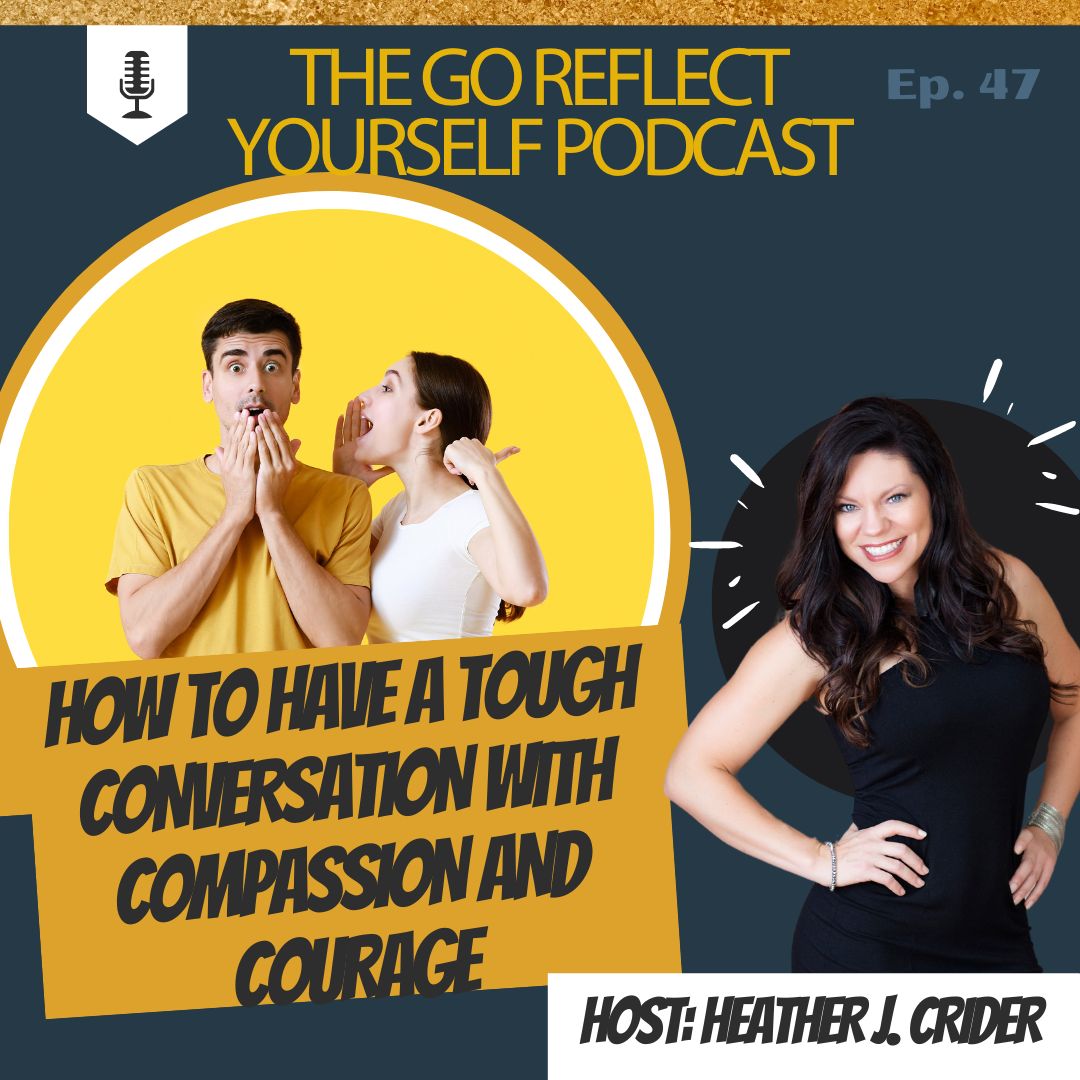How to tackle a tough conversation? Instead of avoiding, stressing and losing sleep…
When a difficult situation arises and you have to tackle a tough conversation it usually is filled with stress and the anxiety. How you talk to yourself as well as how you approach the conversation can have effects, many of which you cannot control. However, when you take a simple 3R approach and reflect prior to a conversation you can tackle a tough situation with compassion and courage so that everyone involved has an opportunity to feel rewarded with integrity, even if the outcome is not perfect.

Today on the Go Reflect Yourself Podcast you will learn a very simple way to tackle a tough conversation compassionately with courage.
This is a must listen to episode where you will learn a little perspective on yourself as well as how to approach others, even if you don’t know how they will respond.
Welcome to The Go Reflect Yourself Podcast, where we provide brain-based strategies for your success; in all key areas of your life, including wealth, health, business, relationships, etc.
Your host, Heather J. Crider, A High-performance strategist, neurocoach, author, and speaker, talks about an instance where she had to tackle a tough conversation and a framework she used to navigate it while using compassion and courage.
—-—-—-—-—-—-—-—-—-—-—-
Listen To The Episode Now
Listen & subscribe on your favorite platform:
Key Tips and Takeaways from this episode
- In business or in life, having difficult conversations are, just that, difficult. But when you apply the 3R method you can grow as well as solve the tough conversation
- Reframe in words that are compassionate but constructive. Keep your frame of reference about you, but consider the other person before entering the conversation.
- Because of your courage, you get a reward. You cannot control the outcome, nor the other person’s response, however, you can benefit from the reward of integrity and courage.
- It takes courage to approach a tough conversation
- To include compassion means to look at all perspectives from everyone’s view point before tackling the conversation
- Feel what you feel and own what you feel
- AND MORE…..
Watch the full episode here on video:
Tune in and as you watch or listen to this episode. Pause every 5-10 minutes and mindfully reflect on what you just heard.
Write down your thoughts, then yawn and stretch before proceeding.
Want to get your pass to the Money Mastery Workshop??
Go here to register now: www.heatherjcrider.com/money-workshop
Please Like and Share:
If you are struck by something, please feel free to share, rate, and review! Help me spread the word and help others so they can experience transformation for themselves!
If there is something you hear in this episode that inspires you, please leave a comment or submit a contact us form and tell me all about it, I’d love to hear from you.
Visit Me On Social Media:@Heatherjcrider
https://www.linkedin.com/in/heatherjcrider/
https://www.instagram.com/heatherjcrider/
A few resources for you:
To learn more about mindset resources:
Visit www.heatherjcrider.com
Remember….What You THINK Matters.
More About The Go Reflect Yourself Podcast
——-
To truly have the life you want; the career, house, family, relationships, car, lifestyle, wealth, freedom, you name it….you must learn what success is and where it comes from, starting with how you think.
Welcome to The Go Reflect Yourself Podcast, where we provide 60-second brain-based strategies for your success; in all key areas of your life, including wealth, health, business, relationships, etc.
Go Reflect Yourself was created after years of being a corporate employee and an independent business owner. Throughout all of those years, I learned that no matter what level of success people had achieved, and specifically financial success, typically they were still missing something, missing true joy, well-being, and fulfillment.
I’ve spent a career helping business owners, leaders, and entrepreneurs learn the skills needed to discover their inner brilliance, and that’s how Go Reflect Yourself was born…my goal is to help as many as possible learn the necessary skills to achieve ultimate fulfillment and well-being.
I am your host, Heather J. Crider, CEO of Digital Architect Media, a high-performance strategist, neurocoach, author, search inside yourself, facilitator, and keynote speaker. (and mom!)
Want some inspiration and instant stress relief?
INSTANTLY TURN PRESSURE INTO PRODUCTIVITY
Get Your 3 Simple Stress Relieving "MicroSolutions" Here
—————————
Full Transcript
transcript:
What happens when you need to have a difficult conversation with someone, there’s times when there are things you need to talk about that might be perceived as being difficult or challenging, or you don’t have a clue how someone is going to respond. And you just need to have a conversation with someone. Maybe it’s a friend, maybe it’s a co worker, maybe it’s a boss, a spouse, an employee, you name it, having a difficult conversation can be well, just that difficult and hard. Today, I’m going to tell you a story about a difficult conversation I recently had and why it takes courage and how you can connect with this person despite it being difficult. And the best way to reframe and use the three what I call the three r method to be able to resolve the conversation. Stay tuned.
Okay, so as I mentioned, I recently had to what I call have a difficult conversation, and let me first start by saying conversations that look like they might potentially have a little bit of a conflict or that you don’t know how someone else was going to respond. Or you need to tell someone, something that maybe they don’t want to hear. It takes a lot of courage. And if you’re like me, I’m just gonna throw myself under the bus. I’m a Sagittarius. And I tend to be a little bit of a quick reactor, and a little bit of hot headed and hot tempered, which means sometimes I come across a little harsh, and a little blunt. Sometimes that’s okay. And to be very honest, when I’m dealing with my clients, sometimes they really appreciate the blunt candor. My children, on the other hand, typically don’t like my blood candor. But my point in saying this to you is blunt, headed, tempered newness is not always effective. And it can come across really mean and harsh and unkind. And an N uncompassionate isn’t even a word. You know what I mean? When you approach someone with kindness, curiosity and compassion, it feels much more connected. And so I’ve really, over the years, tried to develop skills. And when I go reflect myself, these are the things that I’ve uncovered about myself. And I know, and I know my activators, I know the things that really trigger me activate me. And sometimes they’re just not pretty. And that’s really the whole point of self reflection is so we can start looking and analyzing, when can I be a better version of myself, when can I present a better version of myself, for someone, not only to make myself feel better, but to have a better connected and a much more compassionate relationship with someone else? Because the truth is, is if we’re able to compassionately, connect with someone, and we have the courage, of being able to stand up even when things are hard, then everybody benefits from that. And part of compassion. This is where a lot of our world of emotional intelligence and compassion and kindness and even self compassion is looked at as being extremely passive or just like you’re throwing throwing stuff under the rug, or that you’re just sweeping over it in a in a very passive way. I’m sorry, my brains not being very logical right now. Passive is the only word I keep coming up with. But I think you get my point. Emotional Intelligence is used is viewed as soft, these soft skills. I don’t believe in that. Because soft skills has this association with being walked over, or letting things go or letting people off the hook and part of compassion. Part of courage is being bold enough and courageous enough to tell people how you feel without a obligation or even a clue of how they’re going to respond. The outcome you can’t control and having the courage and the compassion to being able to highlight or what I call spotlight the truth is sometimes difficult, but it’s not about putting someone in the spot Light, it’s about shining light on different perspectives. And that’s really what this whole conversation is about having compassionate, collaborative, courageous conversations, even when they might be difficult or perceived as being difficult. So I want to share with you a little story here of something that recently happened with me with a really close friend of mine. And my friend, if you are going to listen to this episode, which you probably will, I first want to start off by saying, I love you. And I’m so grateful for our friendship. And that’s why I really want to share some some of this conversation and I’m going to protect her and protect the conversation and the integrity of our relationship. But I want to share my perspective, because I think this is a great lesson. That happens every day. Because if I go back to what I said earlier, difficult conversations, difficult situations happen every day. And a lot of confrontation is looked at in so much negative light, we get stressed, our bodies get anxious, we lose sleep, because of potential confrontation, or just because of being upset over a situation that may or may not even be the way you think it is. So let me explain briefly what happened and why I’m even telling you this. Recently, one of my dear friends, again, whom I love, and I respect so very, very, very much. We had a brief email exchange with someone else. And she sent me a text message regarding that email exchange. And at the time, I received the text message, I was actually in what she didn’t know, she may not still realize, when I received her text message response, I was dealing with something very heavy. And I was not feeling very good about myself, or was just kind of what I call in a funky moment in a funky place. So when I received her text message,
she had a view of this email exchange. And forgive me, I’m being very vague. So follow along the best you can. But there’s a point. And if you just hang on here with my story, that tend to be long anyway. But anyway, just hang on. There’s a point. When I received her text message, regarding the email that she had read that we exchanged with someone else, she had a different view. And she had some concern over the exchange. We both kind of read into things. And we were both coming from different places and things that neither one of us knew. Unfortunately, this led to a gap in our conversations in our interactions. And she and I actually went several weeks without having a real conversation, we exchanged some very, very short and sweet text messages. We tried to communicate with one another, but we can never completely connect to just have a conversation. So the more time that went on, I thought the worst. I thought, oh my gosh, either I’ve done something horribly to offend my dear friend and she hates me, or I don’t know something either is going on in her life where she’s just either blowing me off, or she just sincerely can’t connect. Either way, I’m going to be very honest, I lost some sleep over it. Because it’s really the first time in our relationship since I’ve been friends with this amazing woman that we’ve had, really any major challenges and difficulties. And it certainly is the longest period of time that we’ve gone without speaking. Now, I don’t know about you. But I’ve had many friendships in many relationships where sometimes you just kind of drift. And sometimes the relationship just deteriorates, maybe for a reason, maybe for no particular reason whatsoever. And maybe in the future, you look back and go hmm, I wonder what happened or maybe you don’t care. I didn’t want any I care about this person greatly. And our relationship is very close. And we’ve been through a lot lot together. And I didn’t want our relationship to deteriorate. I wanted to give her space. She wanted to give me space. But enough was enough and we needed to have a conversation. So we agreed to have a conversation and I really wanted to meet her in person and we just couldn’t make that happen. So We had a conversation over the phone, which was fine. And let me back up. Because this, this is what part of the courageous, difficult and compassionate piece two conversations. And there’s a lot of strategies here. And I’m just going to show you a few that I actually used on myself in this conversation. Before I had the conversation with her when I knew we were going to meet. I had really sat down over the weeks prior, and I really started thinking about what might be going on in her life, what might be going on with her family, what might be going on with her business. And I really didn’t want to make any assumptions. But I also wanted to say, Okay, what might be happening from her perspective, what might she be thinking, again, not to put any words or any specific ideas, but just to look at a different perspective. Because it’s very easy, especially for me, my mind can wander so quickly. And I can think the worst, either in someone or in myself, if I let my mind just totally spiral, I can be thinking, Oh, my gosh, the worst of the worst, this person is not only going to hate me, but she’s going to tell everybody how horrible of a friend and person I am. Or, I don’t know, I’m not saying that I thought that or she thought that but I’m just saying your brain, your mind can wander and take you in places that are dark and dirty, if you let it. And so that’s when I really started reflecting. And over the prior few weeks, when my mind started to wander, one of the techniques I kicked in for myself was is what I call and I’ll share this with you, it’s a strategy I use with all my clients is called Win, win the moment W I N, meaning what’s important now. And so every time I would catch myself drifting or thinking about my friend or thinking about, we’ve ruined our relationship, or I’ve done something that could potentially ruin our, our relationship, or she hates me, or I’ve offended her, whatever my brain might have drifted to, I stopped myself, I may have meditated, or I may have taken a break, physically taken a break. But I always went back to the win strategy, what’s important now and reframe myself into either where I was at the moment who I was interacting with, if it was a interaction with someone else, to make sure that I was fully present. Or if I was working on a task that I needed to start focusing on what’s important now what do I need to be concentrating on right now, instead of letting my mind really take over and take me in places that just were a waste of time. But when I did want to start reflecting and thinking about my friend and possible observations from different perspectives, that’s when I use what I call the three, our method, my three, our method I’m going to share with you right now and it it it can be applied in so many different situations. But the first is that it’s to reflect. And in this case, reflecting on myself, my involvement, and what other things might have been going on in her life. Then I sat back to reframe, reframe my emotions, reframe knowing that part of my emotions in this scenario when I first was activated, was because I was in a pretty funky place. And maybe I read into her message, maybe I overlooked something. Maybe I
forgot something that she had told me that she was working on or that she was busy with. The reframe was also then really looking at what are the possible scenarios or things that might she be thinking or how can I see it from her perspective. The third part of the three, our method is what I call reward. The reward comes from having the courage to do all the other pieces the reward comes from not only having the courage to reflect and reframe, but quite frankly, to move forward in the most compassionate way. That self compassion and compassion for another human without attachment to the outcome. Because the truth is, this is the part that really stresses us out. The most, we don’t have the ability to control the out calm 99.9% of the time, we really, truly cannot control the outcome, we can control our action and our response. So what does that mean? It means when I’m ready to have this conversation with my friend, I don’t know how she’s going to respond. And if I give my gut reactions to things, from my emotion, or a place that doesn’t serve Me or her, that’s gonna damage our relationship and damage, my integrity, and my compassion towards myself and my compassion towards her. So let me fast forward here and kind of get to the meat, she and I did have a conversation. And we both exhibited what I would call a compassionate conversation. We were succinct, and we were very honest with how we felt. And the approach of this is how I felt and why. And the truth is, is, I had said something quite some time ago, that I don’t want to use the word offended. But it because I’m not going to put words in her mouth. But I said something that hurt her quite some time ago. And I did not know it. The perspective she saw what I said, and the perspective of what I saw what I said were very, very different. But the truth is, is it doesn’t matter where I was coming from, with what I had said to her, all that mattered to me was that how it landed, hurt her impact and intention are very different things. And even though my intention of what I actually said, was completely what I thought was a joke. It landed for her in a little bit of a hurtful way, and a little bit of a disrespectful way. And I never ever saw it that way. And so she had the courage to tell me how it landed. That was the impact to her. I had the courage to listen and accept that perspective of how it impacted her without being offended. And she had the courage to accept my intention of where I was coming from, despite the impact and how it landed for her, even though it hurt her. And it was a little disrespectful. And now that I see it from her perspective, and now that I know how she was looking at it. Now I’m thinking oh my gosh, Heather, what a bonehead thing to say, Why did you say that? That’s that was my first reaction. What a bonehead thing. But here’s where the other part of compassionate communication comes in. And the three our method comes in is, I have to forgive myself. I hope she forgives me. And I hope she forgives my intention. And despite my intention, how it affected her. And here it goes back to the cycle of this, she has the choice now to respond either to forgive me or not. I think she does. And I think she will continue to. However, I can’t control
that. And even though I desire the outcome to be obviously a certain way, the truth is, is we never ever, ever can control someone else’s response. And that’s the part about all communication, all conversations involved in those relationships is they might deteriorate because of certain expectations, and perhaps even certain expectations to the outcome. But again, that’s part of the courageous part. And it’s also part of the three our method of integrity to yourself and integrity to respecting the other person enough to be honest, and have the courage to be honest. Despite that. I had another conversation with a with a colleague actually. And we were talking about what I call radical responsibility. And the radical responsibility is really owning your participation in every conversation. And it’s very difficult to look at someone else’s viewpoint because we all have our own viewpoint. And regardless, the lens, the frame, the person activ that I filter things through our mind. And we all I’m gonna just use myself here, we all expect other people to think the way we do. And because we forget that every everything I process in my brain comes through my lens, my experiences shape, how I process everything, good, bad, right or wrong or ugly. So it comes down to really having radical responsibility, because our thoughts, and our words have consequences, regardless of how they land, regardless of our intention, every thought, every word has a consequence, maybe it’s positive, maybe it’s negative, maybe it’s neither. But there’s a consequence to every single thing we think, and every single thing we do. So going back to the attachment to the outcome, we can’t control how other people are going to react. But this is where most of us get into fear, most of us because of fear of what if this person reacts in a negative way. And I’m going to be honest, again, in this situation with my friend over the past month or so, I had certain thoughts of fear, what if our relationship is ruined? What if I no longer have this person in my life. And that’s where I had to use some self reflection tools, like I mentioned earlier of the wind strategy, to keep me present in the things I was doing. But because of that fear, and be because of our own insecurities, and because of our own fears, sometimes we project an outcome that we make out, or, because we’re trying to control it that much. Out Remember, our frame of reference, our experiences shape, the way we filter every single thing through, sometimes our own fears, our own insecurities, our own. Even guilt and shame, causes our integrity to ourselves and others, to fail us in some ways and fail as a really strong word. But it makes us scared, it makes us paralyzed to even have the compassionate, difficult conversation.
So the takeaway I want to have for you today is in business and in life, having difficult conversations, they’re just that they can be difficult. But when you apply some of the strategies I’ve talked about here today with the three our method, where you reflect on a situation, you look at the perspectives, you feel what you feel, you honor yourself. And there’s other layers inside of this, including self compassion, and really looking at your participation and having radical responsibility. But then you reframe. you reframe, in honest, compassionate, constructive ways you keep your frame of reference about you. But you consider the other person before you actually enter the conversation. And then the reward. This is where the this is where we really try to control it. But the reward may not be the outcome that you’re looking for. The reward, however, is releasing the emotions releasing in your brain, releasing the potential fear, doubt, worry, insecurity. And having the integrity, the benefit, the reward comes from the integrity and the courage, courage, and the honesty and respect for someone else to have a difficult conversation. Respect is a big word we actually haven’t talked about here, but that’s another piece and component to again, what I call the three our method. So having said all of that having a difficult conversation is worth it. If you can just take a moment to take a look at your involvement to take a look at potential other pieces to this conversation, what someone else might be feeling, but really keeping it short and succinct of how you feel. And having that courage to stand up for how you feel It is very empowering. And going back to my conversation with my friend, she exhibited great courage in the conversation she and I had by telling me how she felt and being honest with me, of how I hurt her. And that took a lot, because she could have just kept that for herself, and I never would have known. So I give her a lot of credit. And I’m so appreciative of that. And now I know, and you don’t know what you don’t know. And you also don’t know how someone else is feeling. And for me, some things land differently. There’s some days where things land very differently where I don’t pay any attention to it, and some days where it really feels heavy, the way things land. And we also have to be honest with our emotions, and how other things affect us. Really day to day. And that’s just okay, because guess what it means you’re human. Sometimes simply being human is enough. So that’s my takeaway for you today. I hope that this has been beneficial for you, and let me know, connect with me. Let me know how this landed for you. And try it. Try to take a moment in a difficult conversation that you might be experiencing. Just be honest, that be compassionate, and see where it goes. We’ll see you soon.




Leave a reply